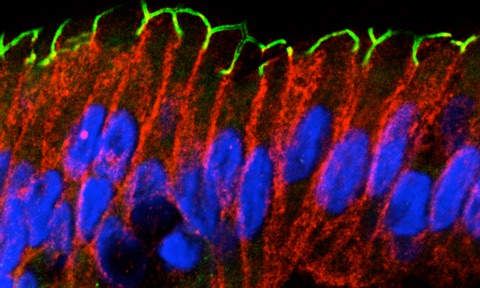WELCOME TO THE CITI LABORATORY

The goal of the Citi laboratory is to understand at the molecular level how specific proteins of the junctional complex of vertebrate epithelial and endothelial cells contribute to physiology and pathology at the subcellular, cellular, tissue, organ and organism levels.
Epithelial and endothelial tissues play a fundamental role in in separating different body compartments, and in the absorption, secretion and barrier functions of major organs. The vast majority of cancers arises within epithelial organs, and invasion and metastasis correlate with disruption or loss of cell-cell junctions. Epithelia are also the first target of pathogens. Endothelial cells play a fundamental role in cardiovascular physiology.
We are specifically interested in clarifying how specific protein components of epithelial tight and adherens junctions interact with the cytoskeleton to regulate cell architecture, signaling and different aspects of epithelial cell and tissue function (barrier, adhesion, pathogen interaction, electrolyte physiology, etc.). We are also very much interested in how mechanical force affects protein conformation and interactions, having discovered in 2017 that ZO-1 is a mechanosensing protein, and in 2022 that cingulin interaction with ZO-1 regulates ZO-1 conformation. In 2023 we showed that cingulin and paracingulin function to recruit specific nonmuscle myosin isoforms to apical junctions.
We use a combination of biochemical, cellular and in vivo approaches, including the generation and characterization of knockout mice, which help us to frame the significance of our discoveries within the context of a whole vertebrate organism.
Please browse the Research and Publications pages for more details of our work!
ARCHITECTURE, MOLECULAR MECHANISMS AND FUNCTIONS OF APICAL JUNCTIONS
Prof. Sandra Citi, MD, PhD
Dept. Cell Biology
University of Geneva
SciencesIII
4, Boulevard d’Yvoy
1211-4 Geneva
Switzerland
HOW TO REACH US:
http://www.unige.ch/sciences/biologie/bicel/directions.html
HOW TO CONTACT US
Tel (Secretary): +41-22-3793054
Fax. +41-22-3796868


MDCKII CELLS
Latest articLES
check THEM out....!
Paracingulin aND microtubules
cingulin and nonmuscle myosin